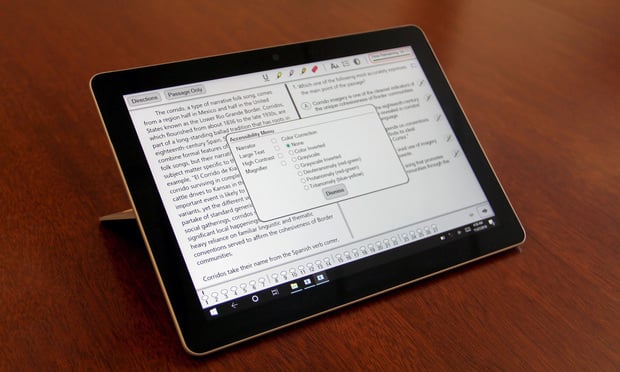Aspiring law students will be able to take the Law School Admission Test at home next month.
The Law School Admission Council, which administers the LSAT, announced late Tuesday that the April 25 LSAT is canceled due to the coronavirus pandemic but that a pared-down version of the test would be available to test takers on their own computers in late May.
It’s a remarkable turn of events for an admissions exam that only switched to digital delivery less than a year ago.
“We are working hard amid this crisis to create new ways for you to take the LSAT and get your score in a timely manner because we know how important it is to you and to fairness and integrity in law school admission, which advances access and equity in legal education,” reads the council’s statement announcing the at-home option. “We appreciate your patience and flexibility as we all work through this extraordinary situation together.”
The cancellation of the April LSAT was not unexpected—the council canceled the March administration and said it would make a determination about whether it was possible to move forward with this month’s test by April 10. But ongoing restrictions on travel and gatherings made giving the exam in mere weeks impossible, the council wrote.
More surprising is the council’s move to deliver an at-home exam in little more than a month. The council said it was working on a remote option when it canceled the March test, but some LSAT watchers were skeptical that it would be able to roll that out quickly. (The LSAT’s competitor on the law school admissions market, the GRE, began offering an at-home option last month.)
“Creating a version of the LSAT that aspiring lawyers can take from the safety of their own homes is a win for test takers, many of whom had their admissions timelines disrupted because of COVID-19-related test cancellations in April,” said Jeff Thomas, the executive director of admissions programs at Kaplan Test Prep. “This makes an uncertain and stressful situation a lot more manageable.”
The at-home test, dubbed LSAT-Flex, will have three 35-minute scored sections as opposed to the traditional five, which includes one unscored section. It should take about two hours to complete under the standard time allowance. Scores will still be delivered in the traditional 120 to 180 range.
The council has yet to announce the exact date of the LSAT-Flex, but said it will be given in the second half of May. The final date will be announced no later than April 17. LSAT-Flex will be “remote proctored,” meaning that test takers will be monitored by the cameras and microphones in their computers and those video and audio feeds will be recorded for further review.
The May test is open to those who registered for the now-canceled April exam. Those who were slated to take the March LSAT were automatically registered for the April exam.
“We will continue to monitor the COVID-19 pandemic closely and will make other LSAT-Flex test dates available this spring and summer if the situation warrants,” reads the council’s announcement. “We plan to resume the in-person LSAT once conditions allow, in strict accordance with public health authorities and using all necessary health and safety measures.”
Steve Schwartz, chief executive officer of test prep provider LSAT Unplugged, said that subsequent waves of the coronavirus could make it difficult to return to the in-person administration of the LSAT in the short- to medium-terms.
“Given the COVID-19 situation, I suspect there will be several LSAT-Flex administrations,” he said. “And the more that there are, the more this becomes the new ‘normal.’”
NOT FOR REPRINT
© 2024 ALM Global, LLC, All Rights Reserved. Request academic re-use from www.copyright.com. All other uses, submit a request to [email protected]. For more information visit Asset & Logo Licensing.








